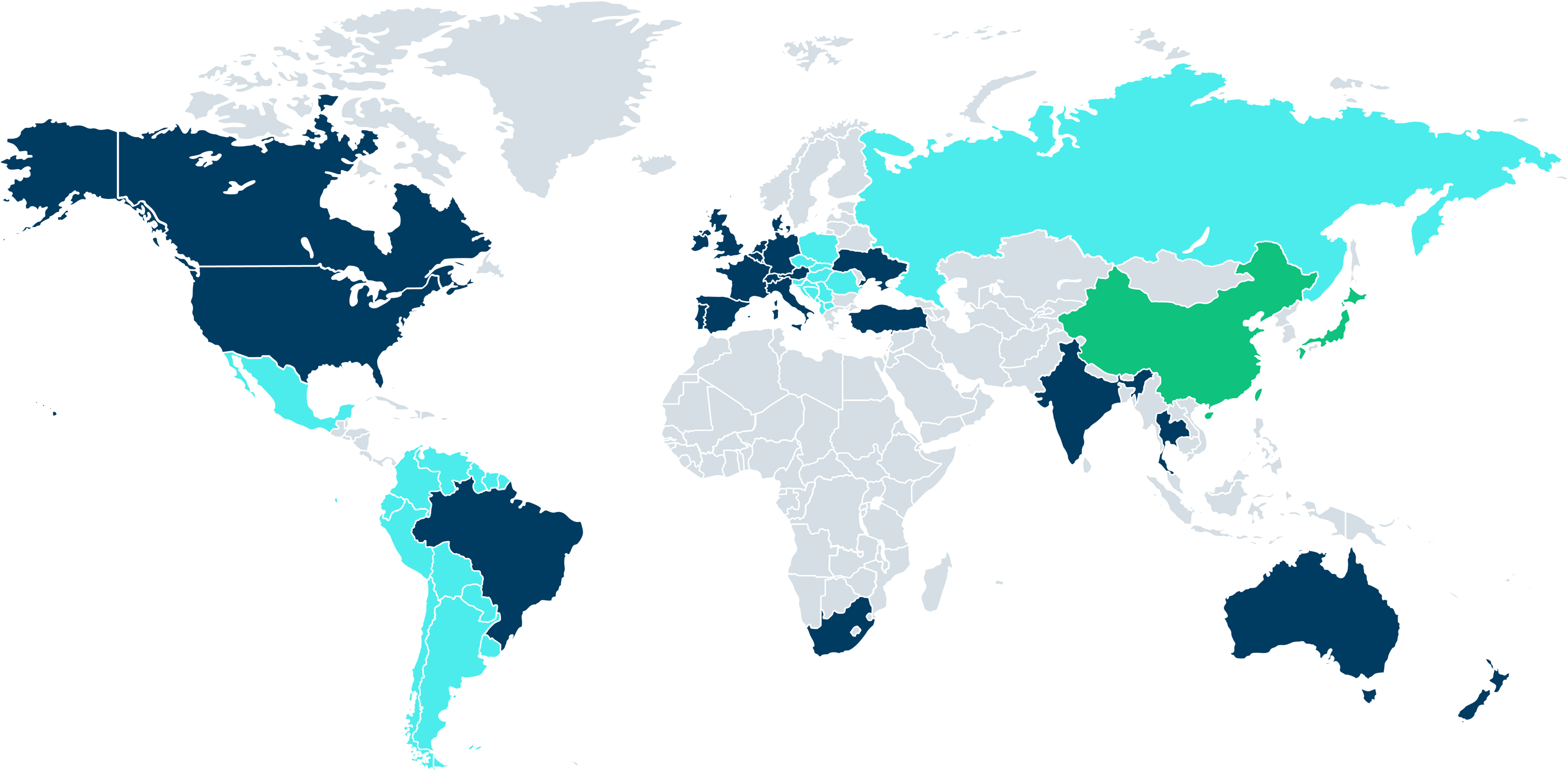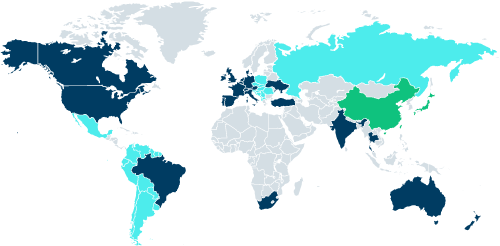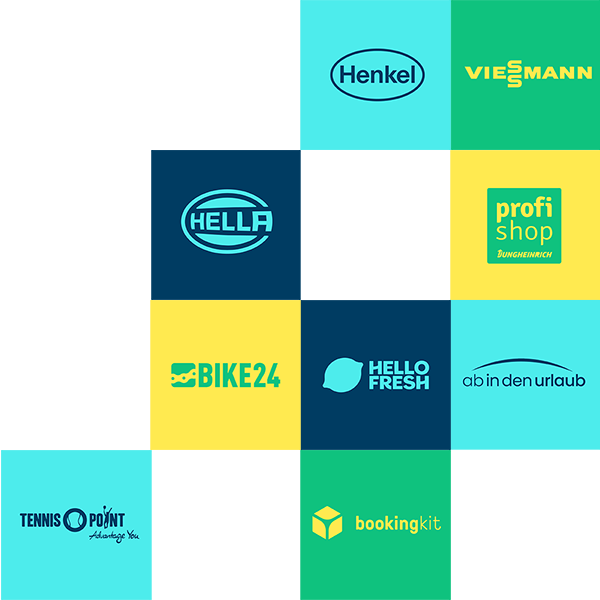Your agency for
International SEO
Different countries, different customs: We assist you in establishing and effectively strengthening the international presence of your brand. With a well-thought-out internationalization strategy, there’s nothing stopping your expansion into other countries and your international SEO success. With us, you’ll meet the expectations of your customers worldwide for your business and website.
![]() Request free of charge & without obligation
Request free of charge & without obligation


Our international SEO services
As a SEO agency, we support you holistically in the development of successful international SEO strategies. Together we develop customized concepts and aid you in all relevant areas around international SEO.

From the development of keyword strategies, potential analyses, technical audits, and relaunch support to needs analyses and strategies in the areas of content and offpage, our services in strategic search engine optimization for multilingual websites are diverse and always individually adapted to your needs and goals.
In developing a content and keyword strategy, we work with you to develop a concrete needs analysis for the respective target market while considering your business model, website, and target group. This will determine how much content is needed and in what form it is required for maximum success.
Depending on the target market, our international experts will adapt your existing content or create new texts that are valuable to your future users and optimized for search engines. The process of localization or transcreation not only includes a text translation into other languages but also preceding research about cultural conditions and culturally shaped search behavior.
Depending on the target market and taking into account individual circumstances, we decide together which domain strategy helps you best achieve your goals and then implement it with you.
We offer international offpage strategies in the areas of offpage audits, disavow analyses, reconsideration requests, and offpage competition analyses.
We ensure that your international relaunch succeeds without any loss of visibility or traffic. For a smooth process, we consider SEO already in the planning phase and thoroughly prepare the technical migration.
Your benefits with Claneo as an international SEO partner
All from a single source
We are familiar with all aspects of search engine optimization. That’s why we can plan and implement SEO and SEA measures and content strategies for you, both locally and internationally. This way, you successfully present your brand with consistent quality in all markets.
Cost advantage
Successful international SEO, SEA, and content marketing needs experts – people with specifiy know-how and direct experience. Managing this in-house often means implementing additional processes with expensive overhead costs. With us as your partner, you save these costs.
Sparring partnership
To achieve good organic rankings in the long term, continuous search engine optimization is necessary. We are by your side as an experienced partner and form the perfect complement to your in-house team.
Country & language experts


The quality of our work is certified
Producing quality work is of utmost importance, which is why we invest specifically in the further training of our employees. For this reason, we regularly have our services and expertise audited by independent institutions such as the German Association for the Digital Economy (BVDW).
Our country experts



Clients who
grow with us
Due to the combination of competence, speed, and flexibility in our daily cooperation, we are a valued partner of renowned corporations and numerous SMEs and start-ups.

Success stories of our clients

Henkel Adhesives
“SEO is a marathon, not a sprint” – so our client Henkel also showed patience and was rewarded for it: for the period from the beginning of 2018 to the end of 2021, total traffic on selected international brand websites increased by a whopping 278%!
This is what our clients
say about working with us

Peter Hartmann

Daniel Gockel


This is how we work with you
01 – Kick off
We get to know you and your team, your international target group, your products, and your problems. Coordination of responsibilities, processes, project management tools used, and the definition of the next steps.

02 – Analysis
Based on the findings from the kick-off, we review the needs per market and make an initial recommendation of the project’s priorities.
03 – Strategy
Development of a customized international strategy based on the company’s objectives, the current market situation, and future goals. In our outside-in analysis, we specifically address the customer and define the right keywords and topics for a market-specific optimization of the country domains or country directories. In the recommendations for optimization, we address both technical and content-related factors and ensure that the right international domain setup is selected.

04 – Implementation
Based on the international strategy, we work together with our customers to implement our recommendations for action. We work in harmony with internal teams as well as technical agencies. Our teams of country experts support in the areas of strategy, technical SEO, content, offpage, and digital PR. Our goal is always to use our capacities and resources based on the needs of our clients and to bring our years of international know-how into the com
05 – Reporting
Search & content marketing is constantly changing, so the defined strategy must be constantly scrutinized and adapted to market conditions. Our monitoring and reporting processes ensure that we identify changes in performance at an early stage and interpret the development for future recommendations for action.
Frequently asked questions
Since customers are now used to using services worldwide and being able to conveniently order from anywhere, the demands on companies and their websites are also growing. However, this development does not only bring the advantage of an extended target group for companies but also the challenge of international search engine optimization.
International SEO describes the search engine optimization of a website for different countries and languages. Essentially, it is s for a company that serves more than one target market and wants to be a leader in each one. It is important to tailor the SEO strategy to the respective target market, accounting for the needs of potential customers as well as the local culture. A comprehensive internationalization strategy is necessary to ensure that a website performs well in terms of SEO not only in its country of origin but also in all other countries. The adaptation to the respective target market plays a central role because a simple translation of the website is far from sufficient here.
The translatability of the brand also plays a significant role, as not every brand name has the same meaning everywhere, and products or services may need to be adjusted accordingly. The rule here is: other countries, other customs. Users search differently from market to market, which is often related to their cultural background and correspondingly different needs and expectations. Therefore, localization is more important here than a mere translation of the website content.
Furthermore, it is essential to carefully consider the domain concept and make a strategic choice, especially with regard to multiregional and multilingual versions of a website.
However, if all important points are considered, international SEO can offer you significant advantages over the competition.
International SEO is mainly relevant for companies where it may make sense to additionally offer their own products or services in other countries. With the right international SEO strategy, different target markets can be addressed, visibility can be increased and in this way traffic on one’s own website, as well as sales can be significantly increased.
The following five factors are particularly important for successful internationalization:
- A well-planned domain strategy: Here, subdomains, country code top-level domains (ccTLD), and directories are available for selection. Since these domain strategies each have different advantages and disadvantages, a decision for a strategy should always be made taking into account the individual circumstances.
- The creation of a localized keyword & content strategy: A mere translation is not sufficient for internationalization, since both the use of language and the search behavior of users differ from country to country. Here it is important to take into account linguistic and cultural differences and, in the best case, to have the localization carried out by native speakers.
- The creation of localized and optimized content: The user experience should also reflect the local expectations of users. Different units of measurement, time zones, payment methods, quality seals, or even the meaning of colors should be taken into account and adapted if necessary.
- Linking the international websites with each other: It can be quite helpful to do internal link building and to link the international websites among each other.
- Linking the respective website out of its target market: It is equally helpful to generate backlinks in the same language and build a good backlink structure. This is because links from the respective target countries can be decisive for search engines in evaluating the GEO relevance of a website.
The biggest mistake is when one simply assumes a direct translation of keywords is sufficient. While translating keywords may be correct in meaning, localization takes local and cultural backgrounds into account.
Example:
If an insurance company from an English-speaking market also wants to gain a foothold in Germany and simply translates “car insurance” as “Autoversicherung”, they will lose a lot of traffic. The reason: In Germany, “KFZ Versicherung” is the keyword that is predominantly searched for, even reaching a search volume four times greater than the keyword “Autoversicherung”. Native speakers help to circumvent these semantic hurdles.
At Claneo we work hybrid. Our team of native speakers is responsible for our core markets: Germany, USA, Canada, UK, Ireland, Netherlands, Belgium, France, Spain, Italy, Turkey, Brazil and Portugal. Markets for which we rarely need individual analyses or texts are not covered internally, but rather organized with highly vetted freelancers (at least two per market).
Since Google is the main search engine in most countries, it basically comes down to strategy and content to be successful internationally.
At Claneo, we work with the six-eyes principle: An SEO analyst takes over the content strategy, an editor writes the content, and a proofreader does the final review. In addition, tools can help to accompany the process or to work with term weightings.
When adapting content to a specific target market, it is not just about translating the content, but primarily about adjusting to the local culture, language usage, search behavior, and the needs of potential customers. For the most thorough localization, using native speakers is recommended.
An international SEO strategy includes, among other things, the following points:
- Translations of content into target languages.
- Optimization of keywords and content for local search queries; for example, it might be useful to highlight local offers and promotions.
- Adjustments to the design and colors used, as they can have different meanings in other countries.
- Consideration of different time zones, payment methods, and units of measurement.
- Integration of local payment and shipping options.
- Consideration and compliance with the legal regulations and rules of the respective country.
If a website exists in at least two languages, it is referred to as multilingual. For example, this is the case when a Canadian company offers its website in both official languages: English and French. Here, Google recommends using a different URL for each language version of the page and marking it with the hreflang attribute.
On the other hand, if a website targets users in different countries, it is defined as multiregional. An example would be a German company that distributes its products in Austria and Switzerland.
A website can also be both multiregional and multilingual. For instance, it might have different versions for Germany and Switzerland, and for Switzerland, it provides content in German, French, and Italian.
A content hub can be beneficial for any company, as it can provide more than just product descriptions. From information gathering and questions about product usage to the after-sales phase, a variety of content can be offered throughout the traditional customer journey. Moreover, this content not only informs website visitors but can also be discovered through popular search engines and, for example, be repurposed for newsletters or social media. Thus, international SEO can also serve as an intriguing source of ideas for other marketing channels.
An essential factor for success in international SEO is choosing the right domain strategy. It is crucial to know in which countries the product or service will be offered in the future, and also to ensure that the website won’t need a complete overhaul if further expansion occurs.
The following domains are conceivable for an international SEO strategy:
- Country code Top-Level-Domain (ccTLD): This strategy involves using country-specific domains like .fr for France or .de for Germany. Typically, these types of domains instill more trust in users, which can be crucial, especially in the e-commerce sector. However, using a Generic Top-Level-Domain (gTLD) like .com or .net is also an option.
- Subdomains: Different language versions of the website are provided under various subdomains (e.g., fr.example.com, de.example.com).
- Subfolders: An alternative to subdomains is using subdirectories (e.g., example.com/fr/, example.com/de/).
These options can also be combined in various ways. The best international SEO strategy depends on the company’s situation, the business model in place, and the goals being pursued. If a website is both multiregional and multilingual, it typically becomes more complex. What matters in the end is that the chosen strategy is well thought out and cleanly implemented to ensure successful internationalization and search engine optimization.
In our experience, a country code domain is a good choice if, for example, you were previously only active in Germany with the country code top-level domain “.de”. Furthermore, studies show that country code domains have a high reputation among local customers. A language directory makes sense if you already have a strong .com with high authority and then decide to localize.
For successful international SEO, interlinking various international websites is crucial. Here, the use of the hreflang attribute plays a significant role.
The hreflang tag signals search engines that multiple versions of a page exist in different languages and ensures that – depending on the country and language – the correct version is displayed. This allows search engines like Google to understand that, for example, the German version and the Austrian version of a page are not duplicate content but are related and both should be indexed.
In addition to interlinking international websites, it is advisable to generate backlinks in the respective target language. For this purpose, strategic link marketing must be done for each version of the website, meaning external sites should link back to your site. If relevant and high-quality backlinks are achieved, it typically leads to increased visibility of the page and better search engine rankings.
On an international level, it is essential to ensure that the generated links genuinely come from the same language region of the target country and appropriately refer to the respective country domain.
For an international SEO strategy, it is crucial to define and maintain consistent KPIs across all countries. Typically, one can consider various levels. A standard level would be impressions, such as how many impressions were generated and how the number of impressions is increasing. Additionally, the development of rankings for a defined set of keywords, focusing on the Top 100, Top 10, Top 5, and Top 3, as well as the evolution of click numbers from month to month and year to year, can be quite revealing.
From an SEO perspective, impressions, rankings, clicks, and user interactions on the website are the most critical KPIs. These numbers can also be easily compared with other countries, as long as one considers where they started and how the figures have evolved over time.
Generally, the larger the company, the more time international SEO will take. From the initial kick-off to the first implementations (meaning the launch of the first content) six months can be a relatively realistic timeframe.
There are various challenges that companies frequently encounter when implementing an international SEO strategy:
- Organization: The company has not internally communicated the “why” strong enough. Therefore, it is unclear why an international SEO strategy should be implemented, and employees haven’t been properly engaged and involved.
- Lack of internal resources: While employees are aware of the importance of the topic, there simply are not enough resources and capacities.
- Pure translation: The focus is more on mere translation than localization. Existing content is directly translated into various languages without further adaptation.
- Collaboration: The company either is not working with the right partner or is working with too many partners due to the vast number of markets. The result is having fragmented local strategies but no global strategy implemented across multiple countries.
Moreover, there are also technical challenges that companies frequently face in international SEO:
- Different technical infrastructures: Ideally, a B2B company has a global, .com, top-level domain with various country directories. However, it becomes problematic if there are different infrastructures or brand names across the different countries.
- CMS: The CMS is not capable of internationalization, for instance, if there is no option for hreflang mapping. It is a problem if hreflang cannot be implemented, leading to incorrect rankings across language directories.
- Classic SEO issues: Technical topics, such as speed optimization, image optimization, a site that is too large due to many subdirectories, or different infrastructures in various markets.
This might also interest you
This checklist summarizes the most important questions you should answer for a successful internationalization of the website:
Content localization
- Have different spellings and formats been taken into account? ?
- Does the chosen design fit the target country?
- Are suitable payment methods offered for each country?
- Are quality seals required? Are these recognized in the target market?
Domain strategy
- Does the chosen domain strategy fit the expansion strategy?
- Are the desired domains available in the target country?
- Are available employees and required support aligned?
Linkbuilding
- How can local and regional publishers be reached?
- Which media and channels are relevant for individual markets?
International targeting
- In which form should the hreflang attributes be implemented?
- Are all language and country versions of a website linked to each other?
- Is it ensured that there are no IP-based redirects?
Our International Search Tool allows users to simulate non-personalized Google queries from all international top-level domains. By freely choosing country and language settings, all relevant SERPs can be found quickly and easily. Step-by-step instructions are available on our blog.
We can also help you here
Content Marketing
We conceptualize holistic content marketing campaigns and develop sophisticated seeding strategies with maximum effectiveness. We focus on the marketing of informative content rather than on the mere promotion of services or products. You can fully rely on our expertise to implement value-added content marketing campaigns on your website.
Offpage SEO
As a digital search marketing agency, we provide you with individual and targeted support in all core areas of offpage SEO. Our international team of experts develops sustainable strategies in close consultation with you and has already helped customers, such as Henkel, Coop, HelloFresh, and Viessmann achieve visible and long-term success.















